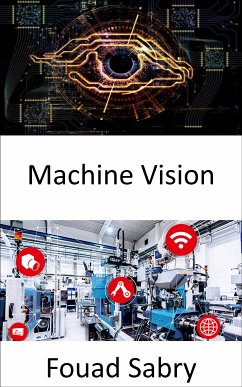What Is Machine Vision
Machine vision (MV) refers to both the technology and the methodologies that are used to deliver imaging-based automated inspection and analysis for applications such as automatic inspection, process control, and robot guiding, which are often utilized in industrial settings. Machine vision is an umbrella term that encompasses a wide variety of technologies, software and hardware products, integrated systems, activities, approaches, and expertise. Computer vision, which is a subfield of computer science, and machine vision, which is a systems engineering subject, may be differentiated from one another. It makes an effort to combine already existing technology in novel ways and use them in the process of finding solutions to issues that occur in the real world. This is the name that is most often used for these activities in situations involving industrial automation; nevertheless, it is also used for these functions in other environments, including those involving vehicle guidance.
How You Will Benefit
(I) Insights, and validations about the following topics:
Chapter 1: Machine vision
Chapter 2: Computer vision
Chapter 3: Thermography
Chapter 4: Gesture recognition
Chapter 5: Smart camera
Chapter 6: Glossary of machine vision
Chapter 7: Outline of computer vision
Chapter 8: InspecVision
Chapter 9: Outline of object recognition
Chapter 10: Active vision
Chapter 11: Structured-light 3D scanner
Chapter 12: Visual servoing
Chapter 13: Visual odometry
Chapter 14: Vision Guided Robotic Systems
Chapter 15: 3D stereo view
Chapter 16: Mikrotron-GmbH
Chapter 17: Air-Cobot
Chapter 18: Objective vision
Chapter 19: Egocentric vision
Chapter 20: Zivid
Chapter 21: Rita Cucchiara
(II) Answering the public top questions about machine vision.
(III) Real world examples for the usage of machine vision in many fields.
(IV) 17 appendices to explain, briefly, 266 emerging technologies in each industry to have 360-degree full understanding of machine vision' technologies.
Who This Book Is For
Professionals, undergraduate and graduate students, enthusiasts, hobbyists, and those who want to go beyond basic knowledge or information for any kind of machine vision.
Machine vision (MV) refers to both the technology and the methodologies that are used to deliver imaging-based automated inspection and analysis for applications such as automatic inspection, process control, and robot guiding, which are often utilized in industrial settings. Machine vision is an umbrella term that encompasses a wide variety of technologies, software and hardware products, integrated systems, activities, approaches, and expertise. Computer vision, which is a subfield of computer science, and machine vision, which is a systems engineering subject, may be differentiated from one another. It makes an effort to combine already existing technology in novel ways and use them in the process of finding solutions to issues that occur in the real world. This is the name that is most often used for these activities in situations involving industrial automation; nevertheless, it is also used for these functions in other environments, including those involving vehicle guidance.
How You Will Benefit
(I) Insights, and validations about the following topics:
Chapter 1: Machine vision
Chapter 2: Computer vision
Chapter 3: Thermography
Chapter 4: Gesture recognition
Chapter 5: Smart camera
Chapter 6: Glossary of machine vision
Chapter 7: Outline of computer vision
Chapter 8: InspecVision
Chapter 9: Outline of object recognition
Chapter 10: Active vision
Chapter 11: Structured-light 3D scanner
Chapter 12: Visual servoing
Chapter 13: Visual odometry
Chapter 14: Vision Guided Robotic Systems
Chapter 15: 3D stereo view
Chapter 16: Mikrotron-GmbH
Chapter 17: Air-Cobot
Chapter 18: Objective vision
Chapter 19: Egocentric vision
Chapter 20: Zivid
Chapter 21: Rita Cucchiara
(II) Answering the public top questions about machine vision.
(III) Real world examples for the usage of machine vision in many fields.
(IV) 17 appendices to explain, briefly, 266 emerging technologies in each industry to have 360-degree full understanding of machine vision' technologies.
Who This Book Is For
Professionals, undergraduate and graduate students, enthusiasts, hobbyists, and those who want to go beyond basic knowledge or information for any kind of machine vision.
Dieser Download kann aus rechtlichen Gründen nur mit Rechnungsadresse in A, B, BG, CY, CZ, D, DK, EW, E, FIN, F, GR, H, IRL, I, LT, L, LR, M, NL, PL, P, R, S, SLO, SK ausgeliefert werden.


